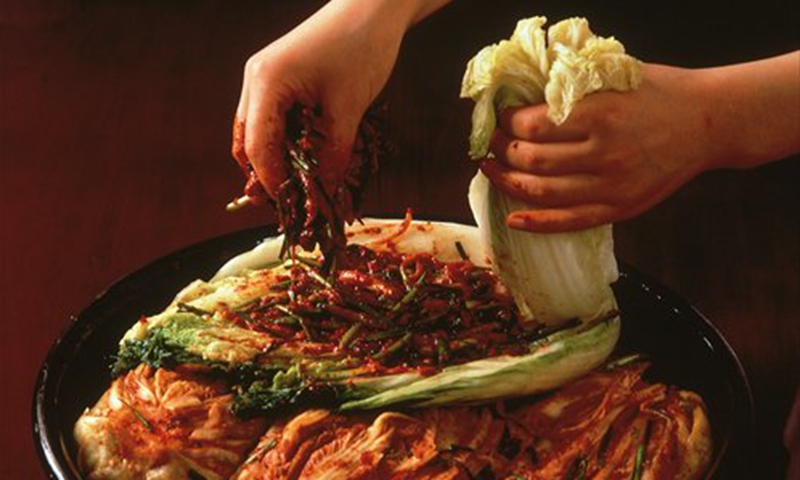
A person making kimchi Photo: CFP
Seo Kyoung-duk, a professor at South Korea's Sungshin Women's University, said Tuesday he had sent an email to Baidu Baike, China's Wikipedia-like platform, to protest the phrase "Korean kimchi originated from China" in its entry with information on the history and culture of Korean kimchi, which Chinese experts disagreed with, refuting it as "unnecessary fuss."
The entry was deleted by a registered user on Tuesday, and also deleted was the phrase that "Korean kimchi has a 3,000-year history."
Baidu Baike updated on Tuesday evening under the
paocai entry that the Chinese character zu, which refers to Chinese sauerkraut, was first recorded in
Shijing or
The Book of Songs written some 3,000 years ago, while citing a report on the website of the Xinhua News Agency in October 2013 that the Korean style has multiple stages of development and the
paocai dish was transferred to Korean Peninsula during China's Three Kingdoms period (220-80.)
"Baidu Baike is a website that can be edited or created by any registered user, and has nothing to do with claims that China is trying to 'steal' South Korean cultural property," Zhu Wei, a communications researcher at the China University of Political Science and Law in Beijing, told Global Times on Tuesday.
Zhu also pointed out that the history of traditional Korean culture and Chinese culture are inseparable, sharing many traces especially in ancient times. "There is no need to argue about this," Zhu said. "The traditional uniforms used in North Korea and South Korea were also in similar style in China's Ming Dynasty (1368-1644). How should we define that?"
The controversy, the latest between Chinese and South Korean netizens, came after news hit that China had won certification from the International Organization for Standardization for
paocai, or pickled vegetables.
This confusion that stems from an innocent lost in translation ignited a feud with defenders of kimchi culture on South Korean social media, who accused China of attempting to "steal our culture," according to media reports.
The two food genres, despite being both called
paocai in Chinese term, vary a lot in making methods and selection of raw materials.
Kimchi refers to a kind of fermented cabbage dish that plays an integral role in Korean cuisine, while
paocai, or Sichuan
paocai, refers to pickled vegetables that are popular originally in Southwest China's Sichuan Province, but now in most parts of northern China.
"The export of South Korean dramas and films has left many people under a false impression that
paocai originated in South Korea," another Chinese netizen said.
Chinese Foreign Ministry spokesperson Hua Chunying said she wasn't aware that China and South Korea netizens are involved in an imbroglio over the origin of kimchi, after some Korean netizens accused China of appropriating their side dish. She emphasized that cooperation and shared benefits between China and South Korea outweigh that.




